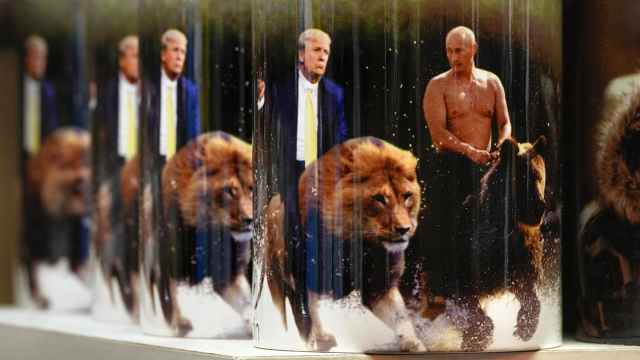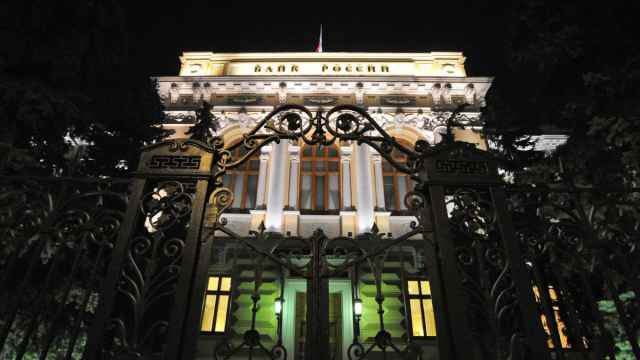U.S. President Donald Trump’s policies, once seen as a potential lifeline for his Russian counterpart Vladimir Putin, are finally delivering a harsh and unintended punishment to Moscow.
In a stunning irony, Trump’s tariff war and reckless trade policies have sent Russian stocks plummeting and oil prices crashing to their lowest levels in four years — potentially sinking the Russian economy in the very way he sought to avoid.
Brent crude is now at just $63, while Urals, Russia’s key export blend, plunged to almost $50 per barrel. This is far below what the Kremlin needs to break even, delivering a severe blow to an already fragile economy. These rock-bottom prices threaten Russia’s strapped budget and all but guarantee another devaluation of the ruble in the coming months.
RBK Daily, a Russian business newspaper, said today that the decline in oil prices “poses serious problems for Russia’s GDP, the state budget and will inevitably lead to a collapse of the ruble exchange rate.”
What Putin hoped would be an opportunity for sanctions relief and economic revival is now shaping up to be a deepening crisis.
But the Trump slump isn’t just an economic blow - it’s also a direct consequence of Putin’s refusal to make peace in Ukraine and his continued defiance of international norms.
For years, Putin banked on a close relationship with Trump back in the White House, which could lead to sanctions relief and a quick reintegration of Russia into the global community. He gambled that Trump’s admiration for strongmen and America First approach would translate into economic opportunity for Russia. But as the oil market nosedives and Russia’s economy begins to fragment, the dream of relief seems to be slipping beyond his grasp.
Russian authorities are now scrambling to shield the country from the growing economic storm triggered by new U.S. tariffs, with Kremlin spokesperson Dmitry Peskov vowing to do "everything necessary" to minimise the damage.
But the reality is grim: Urals oil has plummeted 25% below the budgeted level, dropping to almost $50 per barrel — nearly $20 lower than expected for this year.
The Kremlin is no stranger to the devastating impact of external shocks on Russia's economy. Putin and his finance team will be acutely aware that the last two major economic crises in 2008 and 1998 were both triggered by events beyond its control: the global credit crunch and the Asian financial crisis.
Each time, Russia’s economic stability was pulverised by turmoil in the international markets, exposing its extreme vulnerability of its economy to global forces and leading to waves of bankruptcies and bailouts.
With oil and gas revenues making up about 30% of Russia’s budget, the slide in energy prices poses a major fiscal threat. This correction in commodities could destabilise the federal budget, particularly as skyrocketing military spending on the Ukraine conflict has already expanded the deficit and drained the nation’s rainy-day reserves.
Putin’s over-reliance on oil prices has always been a risky bet. His administration has failed to diversify Russia’s economy, leaving the nation vulnerable to fluctuations in global markets. The slump in oil prices, fuelled by Trump’s trade policies, has only exposed the deep structural flaws within Russia’s economy. While Trump may have once hinted at easing sanctions, the reality is that his policies have pushed Russia further into economic isolation and reliance on China.
The Moscow Exchange sank 2% yesterday, marking its 14th consecutive day of losses - its longest losing streak since Russia’s 1998 debt default. Russian stocks remain largely off-limits for foreign investors due to ongoing sanctions, though there was a brief window of interest during the early days of the current Putin-Trump alliance.
Meanwhile, the prospect of a ceasefire in Ukraine becomes increasingly remote. As Russia’s economic outlook darkens, Putin is unlikely to pivot towards peace talks or negotiations. His regime, already under siege from economic instability, will not entertain concessions in Ukraine. Rather than pursuing diplomacy, Putin will likely dig in his heels, further entrenching Russia’s isolation from the West.
The Trump slump reveals just how fragile Putin’s position truly is. The idea that the Russian leader could exploit a cosy relationship with Trump for economic and geopolitical gain has proven to be a naive miscalculation.
With oil prices sinking, sanctions intact, and global pressure mounting, Putin’s ambitions of reintegration into the international community are fading fast. What once seemed like an opportunity for Russia to break free from its isolation has turned into another painful reminder of the Kremlin’s failures.
Despite the early rhetoric of a reset between Washington and Moscow, the reality has been far different. Trump’s wavering stance on Russia, coupled with bipartisan opposition in the U.S. to any form of sanctions relief, has left Putin’s economic ambitions in ruins.
The Trump slump has exposed the limits of Putin’s ability to manipulate global markets and politics. What was once seen as a potential alliance is now turning into an economic albatross for Russia. The economic pain that Russia is now experiencing, fuelled by falling oil prices and the consequences of Trump's tariffs, underscores the reality that Putin’s refusal to negotiate in good faith has left him isolated.
The chance of sanctions relief, once a cornerstone of Putin’s strategy, is now fading fast. With the U.S. economy riding high on its own energy boom and Trump increasingly focused on domestic political survival, there is little appetite in Washington to entertain any moves toward lifting sanctions.
Russian companies, already reeling from sanctions and burdened with trillions in ruble-denominated debt, had hoped for a swift return to international capital markets and re-entry into the SWIFT payments system. But that now seems like an increasingly distant dream.
The irony of the Trump administration unintentionally sinking the Russian economy through sheer incompetence might be the most fitting punchline to his absurd trade war.
After all, Trump went out of his way to exclude both Russia and its vassal Belarus from his lengthy list of nations targeted with tariffs. Yet, Russia’s over-reliance on oil and gas exports turned it into collateral damage from the broader fallout.
In the end, Putin’s economic ambitions may be crushed. Not by the sanctions, but by Trump’s chaotic blunders.
A Message from The Moscow Times:
Dear readers,
We are facing unprecedented challenges. Russia's Prosecutor General's Office has designated The Moscow Times as an "undesirable" organization, criminalizing our work and putting our staff at risk of prosecution. This follows our earlier unjust labeling as a "foreign agent."
These actions are direct attempts to silence independent journalism in Russia. The authorities claim our work "discredits the decisions of the Russian leadership." We see things differently: we strive to provide accurate, unbiased reporting on Russia.
We, the journalists of The Moscow Times, refuse to be silenced. But to continue our work, we need your help.
Your support, no matter how small, makes a world of difference. If you can, please support us monthly starting from just $2. It's quick to set up, and every contribution makes a significant impact.
By supporting The Moscow Times, you're defending open, independent journalism in the face of repression. Thank you for standing with us.
Remind me later.








